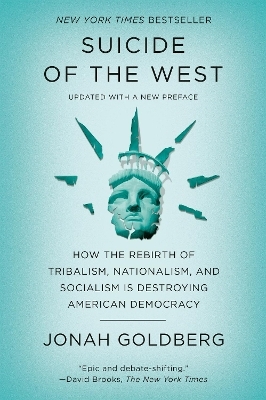
Suicide of the West
Forum (Verlag)
978-1-101-90495-4 (ISBN)
"Epic and debate-shifting."-David Brooks, New York Times
Only once in the last 250,000 years have humans stumbled upon a way to lift ourselves out of the endless cycle of poverty, hunger, and war that defines most of history. If democracy, individualism, and the free market were humankind's destiny, they should have appeared and taken hold a bit earlier in the evolutionary record. The emergence of freedom and prosperity was nothing short of a miracle.
As Americans we are doubly blessed, because the radical ideas that made the miracle possible were written not just into the Constitution but in our hearts, laying the groundwork for our uniquely prosperous society. Those ideas are:
- Our rights come from God, not from the government.
- The government belongs to us; we do not belong to it.
- The individual is sovereign. We are all captains of our own souls, not bound by the circumstances of our birth.
- The fruits of our labors belong to us.
In the last few decades, these political virtues have been turned into vices. As we are increasingly taught to view our traditions as a system of oppression, exploitation, and privilege, the principles of liberty and the rule of law are under attack from left and right. For the West to survive, we must renew our sense of gratitude for what our civilization has given us and rediscover the ideals and habits of the heart that led us out of the bloody muck of the past-or back to the muck we will go.
1 Human Nature Our Inner Tribesman Human nature is real. Few statements are less controversial among the people who study the subject and more controversial among people who don't. It is fair to say that no reputable psychologist, neuroscientist, linguist (including Noam Chomsky), or economist disputes the fact that human beings come preloaded with a great deal of software. Indeed, the fashionable metaphor today is not software but "apps"--as in the applications we have on our smartphones. Different situations trigger different apps, and sometimes these apps can be in conflict. All of the serious debates about nature versus nurture start with the premise that there is already a lot built into our nature. The only question is what we can add on top of nature or what apps we can override. Think of a car. We all generally agree that a car comes with an engine, four wheels, and a steering wheel. These things come standard. That's nature. Nurture provides the options, and there are a great many options. But no matter how many add-ons you buy, a car is not going to be a helicopter. In his enlightening book Just Babies: The Origins of Good and Evil, psychologist Paul Bloom chronicles a remarkable number of experiments conducted on infants and toddlers. (Rest assured: No babies were harmed in the process.) He demonstrates that babies as young as six months already come preloaded with a number of psychological traits that suggest an innate moral sense. For instance, infants between six and ten months old were shown puppet plays. One puppet would be trying to get up a hill. Another puppet would either come to the hill-climbing puppet's aid or it would get in the way, stymieing the climber's efforts. Afterward, the babies were given a choice between the mean puppet and the nice puppet. The babies almost uniformly preferred the nice puppet over the jackass puppet. When a similar study was performed with twenty-month-old toddlers, the kids would reward the nice puppet with candy and punish the bad puppet by taking its candy away.1 Other studies confirm that we are all born with some very basic programming about empathy, altruism, cooperation, and other moral intuitions. Bloom takes great care in pointing out that, just because we are born with a kind of moral sense, that doesn't mean we are therefore moral. Rather, we are born with moral taste buds. How we use them depends on the environment we grow up in and, crucially, how we define "morality." One of the most important findings of not just Bloom but thousands of researchers across numerous disciplines is that we are all born with a natural distrust of strangers. Very young babies can identify language; their cries even have regional accents. "Young babies can recognize the language that they have been exposed to, and they prefer it to other languages even if it is spoken by a stranger," Bloom reports. "Experiments that use methodologies in which babies suck on a pacifier to indicate their preferences find that Russian babies prefer to hear Russian, French babies prefer French, American babies prefer English, and so on. This effect shows up mere minutes after birth, suggesting that babies were becoming familiar with those muffled sounds that they heard in the womb" [emphasis mine].2 Interestingly, our brains dedicate an enormous amount of resources to facial recognition. We are born with an intense interest in human faces. No doubt there are many reasons for this. For instance, much early human communication was done nonverbally and that's still true for humans today, particularly before we learn to speak. One can debate whether reading faces was important in the past or today, but our ability to recognize faces was clearly more vital in the past. Being able to instantly recognize kin or friends from strangers could mean the difference between life and death. (It's telling that our ability to identify faces is actually much more sophisticated than our ability t
| Erscheinungsdatum | 02.01.2020 |
|---|---|
| Zusatzinfo | 18 CHARTS |
| Verlagsort | New York |
| Sprache | englisch |
| Maße | 138 x 208 mm |
| Gewicht | 414 g |
| Themenwelt | Geisteswissenschaften ► Geschichte ► Regional- / Ländergeschichte |
| Sozialwissenschaften ► Politik / Verwaltung ► Politische Systeme | |
| Sozialwissenschaften ► Politik / Verwaltung ► Politische Theorie | |
| Sozialwissenschaften ► Soziologie | |
| ISBN-10 | 1-101-90495-X / 110190495X |
| ISBN-13 | 978-1-101-90495-4 / 9781101904954 |
| Zustand | Neuware |
| Haben Sie eine Frage zum Produkt? |
aus dem Bereich


